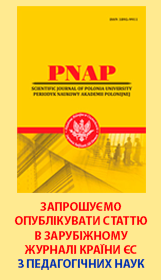The process of reviewing articles consists of the following stages:
1. Articles submitted for publication in the journal Habitus shall be submitted to the Secretary responsible for the initial assessment of compliance with the formal requirements. The article must meet the design requirements. Articles that do not meet the applicable requirements are not accepted for further review.
2. The article is reviewed by one reviewer. The process of reviewing the article is confidential and anonymous (the terms and conditions, content, features and stages of the review, reviewers' comments, and final decision on publication are not disclosed to anyone but the authors and reviewers). The author is informed of the results of the review and the views of the editorial board by email. If the reviewer indicates that certain corrections should be made to the article, the secretary-in-chief sends it to the author with an offer to take into account comments and remarks when preparing the updated version of the article or, in case of disagreement, reasonably refute them.
Ethical standards
The editorial board of the Journal of "Habitus" maintains a certain level of requirements for the selection and acceptance of articles submitted for editorial purposes. These norms are determined by the scientific direction of the journal and the standards of quality of scientific works and their presentation, accepted in the scientific community.
The editorial calls for adherence to the principles of the Code of Ethics for Scientific Publications developed by the Committee on Ethics of Scientific Publications (COPE).
Ethical Obligations of Journal Editors
The editor should review all manuscripts submitted for publication without prejudice, evaluating each manuscript properly, regardless of race, religion, nationality, or the position or place of work of the author (s).
Information is not allowed to be published if there is sufficient reason to believe that it is plagiarism.
All materials submitted for publication are carefully selected and reviewed. The Editorial Board reserves the right to reject the article or to return it for further revision. The author is obliged to revise the article according to the comments of the reviewers or editorial board.
The decision of the editor to accept the article for publication is based on such characteristics of the article as the importance of results, originality, quality of presentation of the material and the correspondence of the journal's profile. Manuscripts may be rejected without review if the editor believes that they do not fit the journal's profile. In making such decisions, the editor may consult with members of the editorial board or reviewers.
Ethical obligations of authors
Authors should ensure that they have written completely original articles, and that if the authors have used the work or words of others, then it has been properly framed in quotation marks or quotes.
Submitting an identical article in more than one journal is considered unethical and unacceptable.
The article should be structured, contain enough links and be designed as required.
Unfair or deliberately inaccurate statements in the article constitute unethical conduct and are inadmissible.
The author who corresponds with the editorial board must ensure that all co-authors have read and approved the final version of the article and have agreed to its publication.
The authors of the articles bear full responsibility for the content of the articles and for the fact of their publication. The editorial board does not bear any responsibility to the authors for the possible damage caused by the publication of the article. The editorial board has the right to remove an article if it is found out that in the course of publication the article violated someone's rights or generally accepted norms of scientific ethics. The editorial board informs the author of the fact of removal of the article.
Ethical obligations of reviewers
The editorial staff adheres to double-blind peer review to ensure that the manuscripts are evaluated objectively
Since the review of manuscripts is an essential step in the process of publication and, therefore, in the implementation of the scientific method as such, each scientist is obliged to do some work on the review.
If the selected reviewer is not sure that his or her qualification is in line with the level of research presented in the manuscript, he must immediately return the manuscript.
The reviewer must objectively evaluate the quality of the manuscript, the experimental and theoretical work presented, its interpretation and presentation, and the extent to which the work meets high scientific and literary standards. The reviewer should respect the intellectual independence of the authors.
Reviewers should adequately explain and reason their opinions so that editors and authors can understand why their comments are based. Any statement that an observation, conclusion, or argument has already been published must be accompanied by a reference.
The reviewer should draw the editor's attention to any significant similarity between this manuscript and any published article or any manuscript submitted to another journal at the same time.
Reviewers should not use or disclose unpublished information, arguments, or interpretations contained in this manuscript unless the author agrees.





